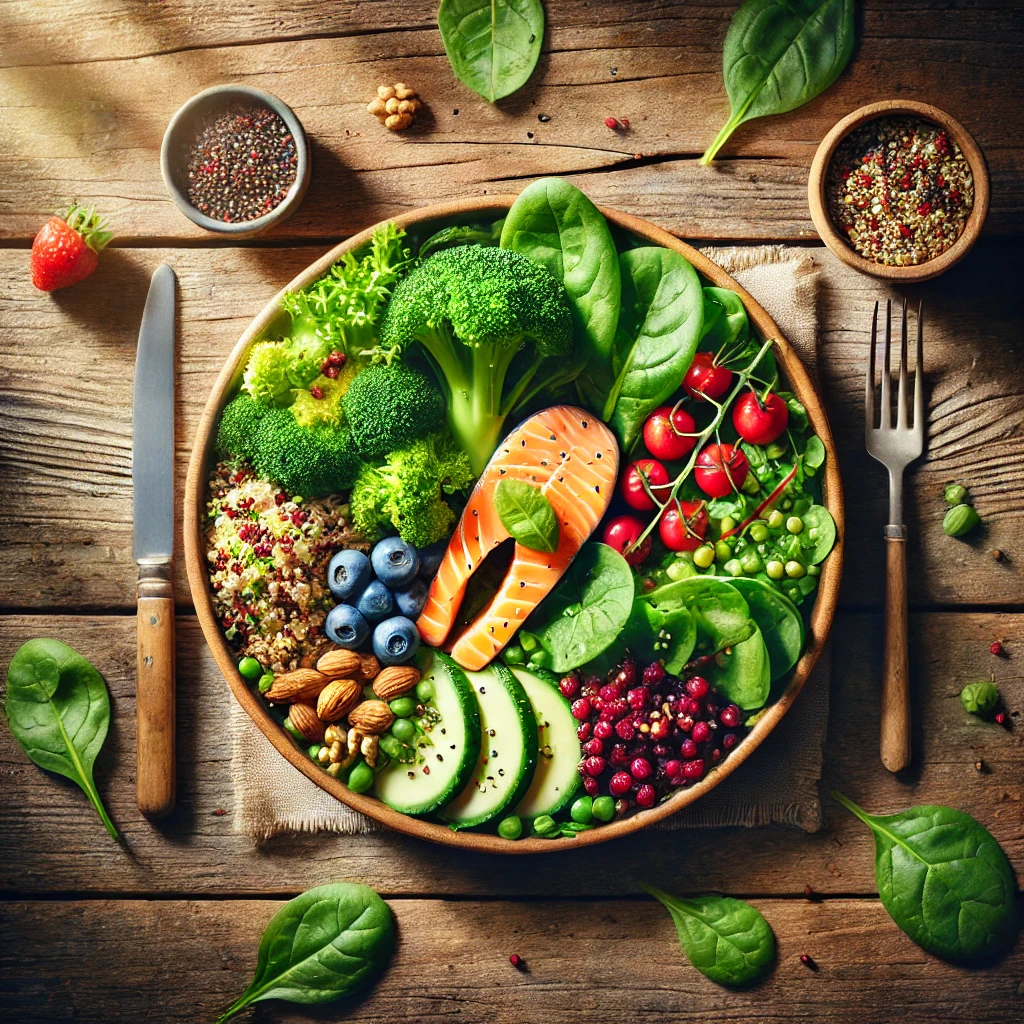A long, vibrant life isn’t just about genetics—it’s about the choices we make every day. From the foods we eat to the way we move, our habits shape our future. Research consistently shows that a balanced diet and regular exercise are two of the most powerful tools for increasing lifespan and improving quality of life. But how exactly do they work? And how can you make simple, sustainable changes for long-term health?
The Science of Longevity: Why Diet & Exercise Matter

Nutrition: Your Body’s Building Blocks
What we eat fuels every function of the body, from cell regeneration to brain activity. A diet rich in whole, nutrient-dense foods helps reduce inflammation, strengthen the immune system, and lower the risk of chronic diseases like heart disease, diabetes, and cancer.
🔹 Key Longevity Foods:
- Leafy greens and colorful vegetables (rich in antioxidants)
- Nuts and seeds (healthy fats and protein)
- Lean proteins like fish and legumes (muscle maintenance)
- Whole grains (fiber for gut health)
- Berries (high in vitamins and anti-inflammatory compounds)
📌 Explore More: What are the best diets for longevity? Research shows that Mediterranean and Blue Zone diets are among the most effective for long life.

Exercise: The Ultimate Anti-Aging Tool
Movement isn’t just about fitness—it’s about longevity. Exercise keeps muscles strong, bones dense, and the heart healthy. It also plays a major role in brain function, reducing the risk of cognitive decline.

🔹 Types of Exercise for Longevity:
- Cardio (Walking, Running, Cycling): Improves heart health and endurance.
- Strength Training (Weights, Bodyweight Exercises): Preserves muscle mass and bone density.
- Flexibility & Balance (Yoga, Stretching, Tai Chi): Reduces injury risk and improves mobility.
📌 Questions for Thought: How much exercise is needed to live longer? Studies suggest that 150 minutes of moderate exercise per week can add years to your life.

The Longevity Lifestyle: Small Changes, Big Impact
Sustainability is key. Rather than drastic diets or intense workout regimens, long-term success comes from consistency. Here are a few simple changes that can make a big difference:

✅ Make Movement a Habit – Take the stairs, go for a daily walk, or stretch while watching TV.
✅ Eat Mindfully – Savor your meals, eat whole foods, and avoid processed junk.
✅ Prioritize Sleep – Recovery is just as important as activity.
✅ Stay Hydrated – Water fuels every function in your body.
✅ Manage Stress – Chronic stress accelerates aging; try meditation or deep breathing.
📌 Explore More: What is the connection between stress and aging? Chronic stress shortens telomeres, the protective caps on our DNA, which can accelerate aging.

Final Thoughts: Your Health, Your Future
Diet and exercise are more than just lifestyle choices—they’re investments in your future. A longer, healthier life starts with the daily habits you build today. The good news? You don’t need perfection—just consistency. By making small, intentional changes, you can add years to your life and life to your years.
📌 Questions for Thought: What is the best balance of diet and exercise for longevity? Research suggests that a mix of a nutrient-rich diet and regular movement is key.

Ready to take the first step? Start now—your future self will thank you.
🔗 Further Resources: Learn More About Longevity
For those looking to dive deeper into the science of diet, exercise, and longevity, here are some valuable resources:
- The Blue Zones Diet: Secrets to a Longer Life – Learn about the regions where people live the longest and what they eat. National Geographic – Blue Zones
- How Much Exercise Do You Need for Longevity? – Research-backed guidelines on exercise and lifespan. Harvard T.H. Chan School of Public Health
- The Link Between Stress and Aging – Understand how chronic stress impacts cellular aging. American Psychological Association (APA)
- Best Foods for Longevity: What Science Says – A breakdown of the best anti-aging foods. Mayo Clinic – Healthy Aging
- Strength Training and Aging: Why It’s Essential – Why lifting weights is key for maintaining strength as you age. National Institute on Aging (NIA)








